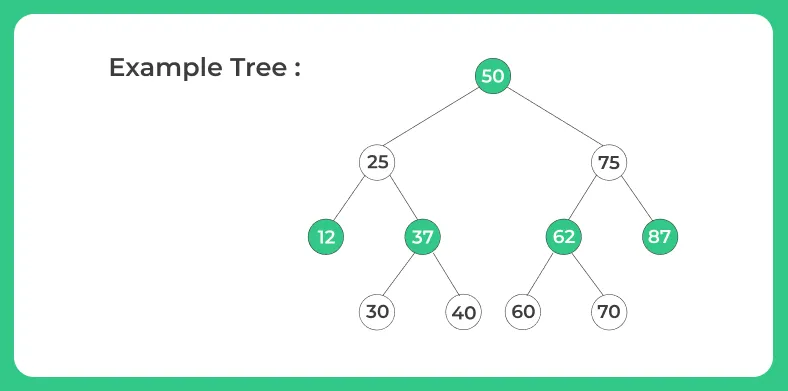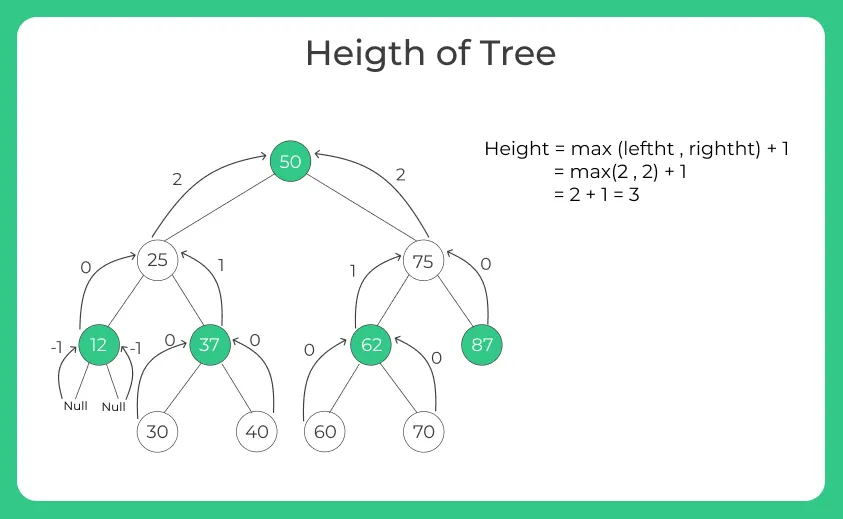Find the Height of Binary Tree
Height of the Binary Tree
A binary tree is a tree-type non-linear data structure with a maximum of two children for each parent. The height of a binary tree is defined as the number of edges between the root node and the farthest leaf node.The height of an empty tree is 0.

Find the Height of Binary Tree
Algorithm
Height of the binary tree can be easily calculated using recursion.
Height of tree= Maximum (Height of left subtree +Height of right subtree) + 1 ( For the node itself ).
Now the left and right subtree height can be calculated with the help of recursion.
Example
Height of binary tree is the number of edges between’s tree root and its farthest leaf. A tree containing a single node has height 0.

For this tree, height is 3. It is obtained with the help of recursion. Each subtree gives its height and at last we get the height of the complete tree. It is explained as:
- height(50) is called initially. It calls height(25) and height(75)
- height(25) calls height(12) and height(37)
- height(12) returns 0 and height(37) calls height(30) (returns 0) and height(40) (returns 0). So height(37) returns max (0,0) + 1 i.e 1
- Now height(25) returns max(0,1) + 1 i.e.2. This is height of left subtree of 50
- In the similar way, we get height of right subtree of 50. The max would be 2.
- Now height of the tree would be- max ( left subtree height i.e. 2 , right subtree height i.e. 2 ) + 1(for the node itself) = 3
- Hence height of the tree is 3.
It is explained as follows:

Java Program to find height of the Tree
import java.util.*;
public class Main
{
// Binary tree class
public static class BinaryTree
{
// Node class
public class Node
{
int data;
Node left;
Node right;
public Node (int data)
{
this.data = data;
this.left = null;
this.right = null;
}
}
private Node root;
public BinaryTree (int[]pre, int[]post)
{
this.root =
this.construct (pre, 0, pre.length - 1, post, 0, post.length - 1);
}
private Node construct (int[]pre, int presi, int preei, int[]post,int postsi, int postei)
{
// this case occurs when a node has only one child
if (presi > preei)
{
return null;
}
Node node = new Node (pre[presi]);
node.left = null;
node.right = null;
if (presi == preei)
{
return node;
}
//Searching pre[presi + 1] in postorder array
int pos = -1;
for (int i = postsi; i <= postei; i++)
{
if (post[i] == pre[presi + 1])
{
pos = i;
break;
}
}
//Number of elements in left subtree
int clc = pos-postsi + 1;
//Left subtree
node.left =
this.construct (pre, presi + 1, presi + clc, post, postsi, pos);
//Right subtree
node.right =
this.construct (pre, presi + clc + 1, preei, post, pos + 1,postei - 1);
return node;
}
public int height ()
{
return this.height (this.root);
}
//Function to find height of binary tree
private int height (Node node)
{
//Base case
if (node == null)
{
return -1;
}
//Calculate height of left subtree
int lht = this.height (node.left);
//Calculate height of right subtree
int rht = this.height (node.right);
//Height of the tree is max of left and right subtree height + 1 (for the node itself)
int rv = Math.max (lht, rht) + 1;
return rv;
}
}
public static void main (String[]args) throws Exception
{
// Construct binary tree
int[] pre = { 50, 25, 12, 37, 30, 40, 75, 62, 60, 70, 87 };
int[] post = { 12, 30, 40, 37, 25, 60, 70, 62, 87, 75, 50 };
BinaryTree bt = new BinaryTree (pre, post);
System.out.println ("Height of the tree is : "+bt.height ());
}
}
Output:
Height of the Tree is : 3
Prime Course Trailer
Related Banners
Get PrepInsta Prime & get Access to all 200+ courses offered by PrepInsta in One Subscription
Get over 200+ course One Subscription
Courses like AI/ML, Cloud Computing, Ethical Hacking, C, C++, Java, Python, DSA (All Languages), Competitive Coding (All Languages), TCS, Infosys, Wipro, Amazon, DBMS, SQL and others
Introduction to Trees
Binary Trees
- Binary Tree in Data Structures (Introduction)
- Tree Traversals: Inorder Postorder Preorder : C | C++ | Java
- Inorder Postorder PreOrder Traversals Examples
- Tree Traversal without Recursion
Binary Search Trees
Traversals
- Traversal in Trees
- Tree Traversals: Breadth-First Search (BFS) : C | C++ | Java
- Tree Traversals: Depth First Search (DFS) : C | C++ | Java
- Construct a Binary Tree from Postorder and Inorder
B – Trees
AVL Trees
- AVL Trees
Complete Programs for Trees
- Depth First Traversals – C | C++ | Java
- Level Order Traversal – C | C++ | Java
- Construct Tree from given Inorder and Preorder traversals – C | C++ | Java
- Construct Tree from given Postorder and Inorder traversals – C | C++ | Java
- Construct Tree from given Postorder and Preorder traversal – C | C++ | Java
- Find size of the Binary tree – C | C++ | Java
- Find the height of binary tree – C | C++ | Java
- Find maximum in binary tree – C | C++ | Java
- Check whether two tree are identical- C| C++| Java
- Spiral Order traversal of Tree- C | C++| Java
- Level Order Traversal Line by Line – C | C++| Java
- Hand shaking lemma and some Impotant Tree Properties.
- Check If binary tree if Foldable or not.- C| C++| Java
- check whether tree is Symmetric – C| C++| Java.
- Check for Children-Sum in Binary Tree- C|C++| Java
- Sum of all nodes in Binary Tree- C | C++ | Java
- Lowest Common Ancestor in Binary Tree- C | C++ | Java
Introduction to Trees
Binary Trees
- Binary Tree in Data Structures (Introduction)
- Tree Traversals: Inorder Postorder Preorder : C | C++ | Java
- Inorder Postorder PreOrder Traversals Examples
- Tree Traversal without Recursion
Binary Search Trees
Traversals
- Traversal in Trees
- Tree Traversals: Breadth-First Search (BFS) : C | C++ | Java
- Tree Traversals: Depth First Search (DFS) : C | C++ | Java
- Construct a Binary Tree from Postorder and Inorder
B – Trees
AVL Trees
- AVL Trees
Complete Programs for Trees
- Depth First Traversals – C | C++ | Java
- Level Order Traversal – C | C++ | Java
- Construct Tree from given Inorder and Preorder traversals – C | C++ | Java
- Construct Tree from given Postorder and Inorder traversals – C | C++ | Java
- Construct Tree from given Postorder and Preorder traversal – C | C++ | Java
- Find size of the Binary tree – C | C++ | Java
- Find the height of binary tree – C | C++ | Java
- Find maximum in binary tree – C | C++ | Java
- Check whether two tree are identical- C| C++| Java
- Spiral Order traversal of Tree- C | C++| Java
- Level Order Traversal LIne by Line – C | C++| Java
- Hand shaking lemma and some Impotant Tree Properties.
- Check If binary tree if Foldable or not.- C| C++| Java
- check whether tree is Symmetric C| C++| Java.
- Check for Children-Sum in Binary Tree- C|C++| Java
- Sum of all nodes in Binary Tree- C | C++ | Java
- Lowest Common Ancestor in Binary Tree. C | C++ | Java





